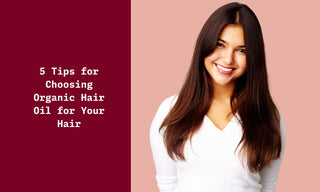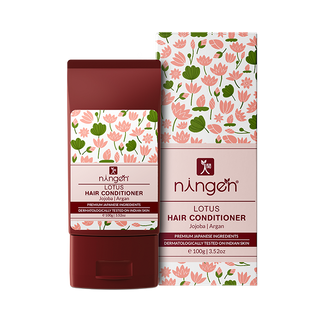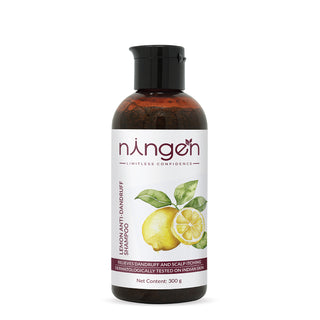Healthy hair starts with the right oil. But choosing the right hair oil can make a big difference in the health and look of your hair. With so many options on the market, it can be tricky to know what’s best. That’s where organic hair oils come in—packed with natural ingredients, they nourish and protect your hair without any harmful chemicals. If you're wondering how to pick the right organic hair oil for your specific needs, this blog will give you five simple tips to guide you. From understanding ingredients to finding the best match for your hair type, you'll be ready to give your hair the care it deserves!
In This Article;
- What Is Organic Hair Oil?
- Ingredients Of Organic Hair Oil
- How to Find the Right Organic Hair Oil for your Hair?
- 1. Identify Your Hair Type and Specific Concerns
- 2. Examine The Ingredients List For Harmful Chemicals
- 3. Choose Oils that Suit Your Hair Type
- 4. Determine the Frequency of Application
- 5. Be Patient For Results to Manifest
- The Bottom Line
- Quick View
- Frequently Asked Questions
What Is Organic Hair Oil?
Organic hair oils are natural oils extracted from plants, fruits, or seeds without the use of synthetic chemicals, pesticides, or additives. They are processed in a way that preserves the purity and nutrient content of the ingredients. Common examples include coconut oil, jojoba oil, argan oil, and olive oil. These oils are rich in vitamins, antioxidants, and fatty acids that nourish the hair and scalp, promoting healthier and stronger hair without the potential side effects of chemical-based products.
Ingredients Of Organic Hair Oil

How to Find the Right Organic Hair Oil for your Hair?
1. Identify Your Hair Type and Specific Concerns
When selecting an organic hair oil, it's crucial to start by identifying your hair type and any specific concerns. Your hair type can be broadly categorized as oily, dry, curly, straight, or a combination. Each type has distinct needs that should guide your choice:
- Oily Hair: If your hair tends to become greasy quickly, you likely have an oily scalp. Opt for light oils that won’t weigh your hair down or exacerbate oiliness.
- Dry Hair/Scalp: Oils rich in hydrating and moisturizing properties can benefit dry hair and scalps, soothing irritation and reducing flakiness.
- Damaged Hair: For brittle or damaged hair, look for oils that can penetrate the hair shaft and provide intensive repair and strength.
- Curly Hair: Curly hair often requires nourishing oils that enhance curl definition and combat frizz.
2. Examine The Ingredients List For Harmful Chemicals
Check the ingredients list carefully when choosing organic hair oil. Avoid harmful chemicals like sulfates, parabens, and silicones, which can strip natural oils and irritate the skin. Steer clear of drying alcohols like ethanol or propanol. Instead, opt for oils like cold-pressed virgin coconut, organic olive, or castor oil, which are rich in fatty acids and vitamins, promoting healthy hair and scalp. Being mindful of what you apply to your hair is essential for overall well-being.
Common Ingredients to Avoid in Hair Care:
- Sulfates: Strips natural oils, causing dryness and irritation.
- Parabens: Linked to hormone disruption and an increased cancer risk.
- Silicones: Cause buildup, weighing down hair and leading to breakage.
- Alcohol: Short-chain alcohols can dry out hair.
- Synthetic Fragrances: Can trigger allergic reactions and long-term health issues.
- Formaldehyde: A carcinogen that irritates skin, eyes, and lungs.
- Phthalates: Often being hidden in "fragrance," linked to endocrine disruption.
3. Choose Oils that Suit Your Hair Type
When picking an organic hair oil, make sure that it matches your specific hair type to gain maximum benefits:
- For Dry, Brittle Hair: Look for oils rich in fatty acids and oleic acid, like olive oil or coconut oil, which can nourish the hair shaft and promote a healthy scalp.
- For Oily Hair and Scalps: Lightweight oils that won't weigh down your strands are ideal. Jojoba oil is known to mimic the scalp's natural sebum, balancing oil production.
- For Curly or Frizzy Hair: Embrace oils like argan or castor oil that can tame frizz and add definition to curls without leaving a greasy residue.
- For Damaged Hair: Seek out oils packed with antioxidants and vitamins, such as almond oil or castor oil, to help repair the hair shaft and foster healthy hair growth.
- For Fine Hair: Opt for a non-greasy formula that can be easily absorbed without leaving your hair looking limp. Grapeseed oil is a superb selection for this hair type.
Integrate the use of hair oils into your hair care routine by applying them to damp hair or using them as a hair mask, massaging in a circular motion to stimulate the hair follicles and scalp health.
Also read: Natural Vs Synthetic hair oil
4. Determine the Frequency of Application
Determining the frequency of application for organic hair oil depends on several factors, such as hair type, scalp condition, and specific hair concerns. Here is a concise guideline to help you decide how often you should apply hair oil:
- Hair Type:
- Oily Hair: Once a week to avoid excess grease.
- Dry/Brittle Hair: Two to three times a week to provide moisture.
- Normal Hair: Once or twice, a week depending on your need.
- Scalp Condition:
- Oily Scalps: Less frequent application; focus on hair shaft instead of roots.
- Dry Scalp: Regular application to maintain scalp health; consider lightweight oils.
- Balanced Scalp: Moderate application tailored to hair's response.
- Hair Concerns:
- Damaged Hair: Frequent applications may be beneficial for repair.
- Frizzy Hair: Regular application can help smooth hair cuticles.
- Curly Hair: Routine application to retain curl definition and hydration.
For maximum benefits, it's important to adjust the frequency as you observe how your hair and scalp respond over time. Begin with less frequent applications and increase as necessary. Always apply to damp hair for better absorption, and use a circular motion when applying to the scalp to stimulate hair follicles and promote healthy hair growth.
Optimal Application Duration for Different Hair Types

5. Be Patient For Results to Manifest
Choosing the adequate organic hair oil for your hair is destined to be a transformative step in your hair care routine. To ensure you're picking a product that will offer the numerous benefits you seek, such as fostering healthy hair growth or restoring scalp health, consider these five tips:
- Know Your Hair Type: Hair oils are not one-size-fits-all. For oily hair or oily scalps, lightweight oils like jojoba may be ideal, whereas coconut oil is a great match for dry hair and dry scalp conditions.
- Look for Specific Ingredients: For dry, frizzy, or brittle hair, oils rich in fatty acids like olive oil can help. If promoting hair growth is your goal, oils like castor oil, which is high in oleic acid, are recommended.
- Check Hair Concerns: If you have damaged hair, look for oils that can penetrate the hair shaft and moisturize from within—like avocado oil. For curly or coarse hair textures, thicker oils may be needed to lock in moisture.
- Go for Natural: Opt for hair oils with natural ingredients and without harsh chemicals. This ensures you're providing your hair with the maximum benefits without potential damage.
- Use Correctly: Apply oil over damp hair to improve absorption. For a deeper treatment, massage into your scalp in a circular motion, working down the hair shaft, and consider using it as an overnight hair mask.
Remember, when incorporating a new product into your hair care routine, it’s important to be patient for results to manifest. Organic hair oils can take time to nourish your hair follicles and improve the overall health of your hair.
Also read: How to take care of your hair during monsoon?
The Bottom Line
Understanding the harmful ingredients commonly found in hair care products is essential for maintaining healthy, vibrant hair. Avoiding chemicals like sulfates, parabens, silicones, and artificial fragrances can help you prevent damage, irritation, and long-term health risks. Opting for natural, organic products enriched with beneficial oils and nutrients will not only protect your hair but also promote its growth and strength. Remember, a little diligence in reading labels and choosing the right products can go a long way in achieving the beautiful, healthy hair you desire.
Quick View
Avoiding harmful hair care ingredients like sulfates, parabens, silicones, and artificial fragrances is crucial for healthy hair. These chemicals can strip natural oils, cause scalp irritation, and lead to long-term health issues. Opt for natural and organic products with nourishing ingredients to protect your hair and scalp.
Frequently Asked Questions
Q1. Why should I avoid sulfates in hair products?
Sulfates can strip natural oils from your hair and scalp, leading to dryness, irritation, and potential damage, especially for color-treated or sensitive hair.
Q2. Are all parabens harmful in hair care products?
Parabens can disrupt hormonal functioning and have been associated with health concerns. It’s best to avoid them in favor of natural preservatives.
Q3. What are silicones and what makes them bad for hair?
Silicones can cause buildup on the hair, weighing it down and preventing moisture from penetrating, which can lead to dryness and breakage.
Q4. How do I know if a product contains phthalates?
Phthalates are often hidden under the term "fragrance" or "perfume." Choose products labeled as phthalate-free.
Q5. What are some natural alternatives to harmful hair care ingredients?
Ingredients like aloe vera, coconut oil, shea butter, and essential oils provide nourishment without the harmful effects of chemicals.
Q6. Can artificial fragrances really harm my hair?
Yes, artificial fragrances can cause scalp irritation, allergic reactions, and have been linked to hormone disruption and other health issues.
Q7. How often should I oil my hair?
The ideal frequency for oiling your hair depends on your hair type and scalp condition:
- Dry or Damaged Hair: Around 2-3 times a week for added moisture and nourishment.
- Oily Hair: Once a week to prevent excess greasiness.
- Normal Hair: 1-2 times a week for maintenance and overall health.
- Curly or Coily Hair: 2-3 times a week to keep curls hydrated and defined.
- Fine or Thin Hair: Once a week or less to avoid weighing it down.
Adjust the frequency on the basis of your hair's needs and seasonal changes to keep it healthy and balanced.
Q8. How do I switch over to natural hair care products effectively?
Gradually introduce natural products into your routine, avoid using harmful ingredients, and be patient as your hair adjusts to the new regimen.










